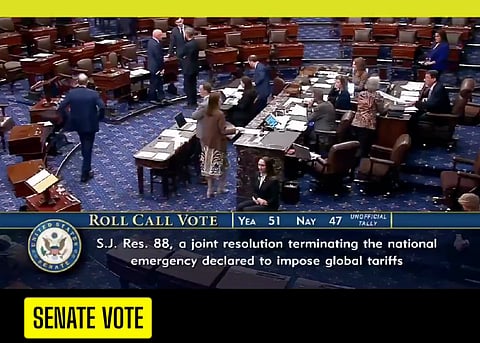US Senate votes to end Trump's power to impose global tariffs: What it means
Legislative measure to terminate the national emergency declared to impose global tariff

In a significant move, the US Senate voted to pass a resolution terminating President Donald Trump's authority to impose global tariffs under a national emergency declaration made in March 2025.
In the October 30 vote, 51 senators, including four Republicans (Mitch McConnell, Susan Collins, Lisa Murkowski, and Rand Paul), joined all Democrats to curb Trump's use of emergency powers to justify tariffs up to 50% on imports from over 100 countries, a move criticised for potentially increasing costs for American households and undermining Congress's constitutional authority over trade.
This vote marks the second consecutive night of GOP dissent against Trump, indicating a crack in his party's unity and his diminishing control over Republican lawmakers.
Earlier in the week, the Senate had already voted to block similar tariffs on Brazil and Canada, with the same four Republicans crossing party lines, signaling a pattern of opposition to Trump's tariff policies.
'Dead on arrival', veto
Despite the Senate's action, the resolution faces significant hurdles in the Republican-controlled House, where Speaker Mike Johnson has indicated such measures are "DOA" (dead on arrival), and it would likely face a veto from Trump if it reached his desk.
The vote reflects broader concerns within the GOP about the economic impact of Trump's tariffs, particularly on sectors like farming and manufacturing, and comes amidst ongoing Supreme Court arguments challenging Trump's authority to use emergency powers for tariffs.
This legislative pushback occurs against the backdrop of Trump's volatile trade policy, which has been criticised for throwing the global economy into chaos and prompting warnings from the International Monetary Fund about negative effects on global growth.
The dissent from key Republicans like McConnell, who has a history of criticising Trump, and others representing states with significant trade ties to Canada, underscores a rare bipartisan effort to curb executive overreach in trade policy.







